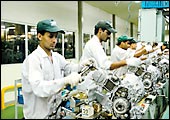
|
 |
| ITES: The sector expects
to generate massive employment this quarter |
MANUFACTURING & ENGINEERING:
A large number of people will get soaked in by this sector
in Mumbai, Pune and Kolkata |
 |
 |
| FINANCIAL SERVICES: Cities
like Mumbai and Kolkata will see a surge in job opportunities
in the financial services sector |
INFRASTRUCTURE: The sector
expects this quarter to be as good as the previous one |
 |
 |
| IT: The sector gave a major
boost to employment in Bangalore, Hyderabad and Chennai |
RETAIL & FMCG: Hiring
in retail dipped marginally due to the end of the festive
season between October and December |
| Help,
Tarun! |
| Slicing
The IT Pie |
The
good news just got better. The recruitment boom in the country
continues unabated. Every sector of the economy is generating
massive employment across the board and, as the Second (quarterly)
Business Today-TeamLease Employment Outlook Survey indicates,
will continue to do so in the current quarter as well-some with
greater gusto than others. The overall Net Employment Outlook
(calculated as the difference between the proportion of respondents
reporting an increase in their hiring needs and those expecting
a decline, and expressed as a percentage) stands unchanged at
81.
This survey, like the first, covered 490
companies across eight cities-Mumbai, Delhi, Bangalore, Kolkata,
Chennai, Pune, Hyderabad and Ahmedabad (see Methodology for details)-and
indicates that the recruitment process is getting more metro-
and big city-centric. An overwhelming 96 per cent of respondents
say they will recruit mainly in the metros and in Class 1 towns,
compared to 78 per cent last time. Employers in Mumbai, Bangalore
and Delhi are the most bullish about adding to their numbers.
But, in an indication that the economic boom is spreading more
equitably across the country, Kolkata-the laggard in the last
survey, and the-last placed in this one as well-shows the highest
net increase in Business Outlook. Overall, there is a six- point
jump in this index-a sign that India Inc is oozing confidence
about its prospects.
Jobs, Jobs Everywhere
This is a good time to be a job seeker. Every
single sector-ITEs, IT, financial services, manufacturing and
engineering, infrastructure, and retail, media and FMCG-is taking
on people. The star sectors are ITEs and it, followed by financial
services. The reasons aren't hard to find. Says Pratik Kumar,
Corporate Executive Vice President, Human Resources, Wipro: "The
Indian IT services and BPO industry is expected to grow from $17.2
billion (Rs 77,400 crore) in 2005 to $60 billion (Rs 2,70,000
crore) by 2010." This more than three-fold increase will
naturally open up huge job opportunities in this sector. In fact,
hiring and retaining talent will be the biggest challenge in future.
The financial services sector is also on
a hiring spree. That's not really surprising, given the state
of the stock market, the boom in the mergers and acquisitions
(M&A) space and the loan-fuelled consumption boom. For proof,
just refer to your own experience-how many times in the last month
have you received calls from those irritating tele-callers offering
you credit cards and loans for cars, houses and just about everything
else under the sun? Each of those call centre execs is backed
by an army of roving salesmen (and their supervisors) ready to
come calling on you with a catalogue of their wares. "We
have recruited, on average, 10,000-12,000 people in each of the
last two years; and we expect to maintain this number over the
next 3-5 years," says K. Ramkumar, Group Chief Human Resources
Officer, ICICI Bank.
The retail, infrastructure and manufacturing
sectors show a dip in hiring expectations compared to the last
quarter, but it must be noted here that this is actually a relative
decline, i.e., fewer companies expect to recruit compared only
to the last quarter. In absolute terms, the Net Employment Outlook
for each of them shows extremely healthy, even bullish, index
scores of 71 and above. The decrease in the index score for the
retail sector "can largely be attributed to the end of the
festive season between October and December, when there is, typically,
a spike in business and a consequent demand for people,"
says the survey. "The sluggishness in the retail sector may
also be due to the fact that necessary infrastructure is still
being built," says T. Sreedhar, Managing Director, TMI Network,
a Hyderabad-based executive search firm.
Crystal-gazing
These are some of the key findings
of the survey |
»
The employment outlook index of Bangalore reflects
the sharpest net increase, at 7%; its business outlook fell
marginally by 1%
» Hyderabad
and Pune also expect an increase in net employment over the
last quarter
» There
is expected to be a net increase in hiring across ITES, IT
and financial services sector compared to the last quarter
» The
ITES sector shows the sharpest net increase in employment
outlook since last quarter at 11%
» The
sharpest net increase in business outlook growth over the
last quarter has been in Kolkata at 13% followed by Pune at
9%, Ahmedabad 8%, Chennai 7%, Hyderabad and Delhi at 6% each
» 96%
of respondents expressed an intention to hire from Metros
and Class-I cities. Metro and class I cities, an 18% net increase
over last quarter
» 87%
of the companies have expressed considerable intention to
hire at junior level, whereas 1/4th of the companies intend
to hire at middle level
» The
manufacturing sector is the major contributor to the employment
growth in the cities of Mumbai, Pune, Ahmedabad and Kolkata
» IT and
ITES sectors are the major contributors to employment growth
in the cities of Bangalore, Hyderabad, Ahmedabad and Chennai
» Financial
services sector is the second major contributor of employment
growth in Mumbai and Kolkata
» A fourth
of all respondents have indicated an intention to hire marketing
professionals followed by IT and Production (18% each)
» The
retail sector reflects a decrease in overall business and
employment outlook over the last quarter. The decrease can
largely be attributed to the end of the festive season between
October-December, when growth in business leads to a rise
in demand for people |
The Boom Towns
Companies in Mumbai remain the most optimistic
about adding to their headcount, though the index for the city
is down 5 points compared to the previous quarter. But with a
net score of 90, it will be churlish to quibble about this. Bangalore
joins Mumbai at the top this time and Delhi follows just a step
behind. The heartening point is that all the cities, except Kolkata,
more or less reflect the national average, indicating that the
recruitment boom is fairly evenly spread out across the surveyed
cities. Fewer companies in Chennai and Ahmedabad expect to recruit
this quarter, but despite this, their absolute scores remain healthy.
Kolkata is the only city whose score shows no change from the
last quarter, but as we pointed out last time, the city suffers
only in comparison to the rest of the country; in absolute terms,
companies that plan to recruit still outnumber those that don't
by a fair margin.
The bullishness in the IT, ITEs and financial
services sectors explains why Mumbai and Bangalore are in pole
position. A majority of companies in these sectors are based in
these cities. Large scale recruitment by them will naturally lift
the score of the cities they operate out of.
The Geographical Spread
Companies were asked where they would hire
their personnel from. An overwhelming 96 per cent said they would
do so from the Metros and Class I towns-a dramatic shift from
the previous survey in which 22 per cent of the respondents had
expressed a desire to recruit from Class II towns and from rural
areas. This is not surprising, given the sectors-ITEs, IT and
financial services-that are driving the Employment Outlook Index
this quarter, but it does raise concerns about the inclusiveness
of the employment boom we are witnessing. Planners, please take
note. "The challenge will be to map the available skill sets
and work out the challenges of last-mile employability to sort
out this issue," says Sampath Shetty, Vice President, TeamLease
Services. This trend will bear watching and will require urgent
redressal without which there could be widespread social unrest.
A caveat: the survey covered only the eight cities mentioned above
and so, does not reflect employment trends in the smaller centres.
Who's Being Hired
"It's like a pyramid," says Shekhar
Patil, Vice President, Human Resources, HCC, a leading manufacturing
and engineering company. "The bulk of recruitments is taking
place at or near the bottom of the pyramid, and some at the middle
level." This is corroborated by ICICI Bank's Ramkumar. "We
are recruiting across all levels, but the majority of new recruits
are joining as what we call Execution Officers (entry-level position)
and at other junior management levels," he says. This squares
up well with the findings of our survey that indicates that 87
per cent of respondents will recruit junior management staff and
shows little change from the previous quarter.
Adds Patil: "We're also recruiting at
senior levels; and these aren't replacements for people who have
quit; we're recruiting senior people to drive our growth."
There is, however, a dip in the amount of senior-level recruitment
that is likely to take place this quarter. But if you're holding
a mid-level position and want to move, don't lose heart. The survey
shows that one out of every three recruiters (more or less the
same as in the previous quarter) is looking for executives at
this level. Says Ramkumar: "We're recruiting a fairly large
number of mid-level executives."
| METHODOLOGY |
| The Business
Today-TeamLease Employment Outlook Survey, which follows a
rigorous, statistically validated process adhering to the
highest standards in market research, was conducted among
490 companies selected from the Centre for Monitoring Indian
Economy database, from nasscom for it companies and from companies
registered with the website of www.bpoindia.org for ITEs companies.
A combination of database and random sampling as a technique
has been used. Care was taken to ensure a good mix of large,
medium and small companies as also an equitable representation
across industries to remove any bias or variation which might
be attributable to a particular industry. The target respondents
at these companies were the hr heads or decision makers in
the hiring process. The questionnaire used for the survey
collated information on overall business improvement (last
three months and next three months); overall recruitment needs
(last three months and next three months) and recruitment
trends (across age, geographies, cities, functions and levels).
A total of 490 interviews were conducted during August and
September over telephone and responses obtained were coded
at the time of data collection. The information was then analysed
using the Statistical Package for Social Sciences software,
which is used by research and consulting companies worldwide.
Given the concentration of companies in Mumbai, Delhi, Kolkata,
Chennai, Bangalore, Hyderabad, Pune and Ahmedabad, the study
was restricted only to companies with a presence in these
cities. A random sampling was drawn from each city with due
weightage to size. Two indices, The Employment Outlook Index
and the Business Outlook Index were computed to elaborate
and analyse the trends that emerged from the data. |
Pick Your Job
If you're looking for a job, this will sound
like music to you. Whatever your specialisation-marketing, it,
production, finance, administration or hr-there's a job waiting
for you. The survey indicates that India Inc's hunger for talent
is all-pervasive and straddles the entire spectrum of functional
areas. The message that the survey sends out is: India Inc needs
you. Like in the previous quarter, marketing is the function most
in demand (we know that, don't we, given the number of marketers
we shoo away every day), though it has lost some of the decisive
lead it enjoyed in the previous quarter. One in four companies
is looking for marketers now compared to one in three then. The
IT function maintains its second position and its index score
of 18. "The middle class considers a career in software to
be the gateway to a better life," says Gautam Sinha, CEO,
TVA Infotech, a Bangalore-based hr consulting firm. So, this is
good news for middle-class India.
And here's a nugget of information for all
those bleeding hearts who were crying themselves hoarse over the
so called "jobless growth" in India. One in six companies
(18 per cent) plan to hire production professionals this quarter.
The high growth rates experienced by the manufacturing sector
are, at last, translating into more jobs for white-collar workers.
It can safely be assumed that this follows the building up of
additional capacities. Logically, a growth in the blue-collar
workforce should follow. Whether it does or not will be interesting
to watch.
Euphoria Inc
Will the Indian GDP growth rate touch the
magic figure of 10 per cent anytime soon? Will the BSE Sensex
hit 15,000 this month? Will India become an economic superpower
within our lifetime? Given its current state of euphoria, India
Inc, if asked these questions, may well reply in the affirmative.
And IT companies, in particular, seem to be in the throes of ecstasy.
There's no other way of describing a Business Outlook Index score
of 96. Five of the six respondent groups have registered index
scores of 90 and above. And here's the clincher: retail, media
and FMCG, which registered a decline of 15 points from the last
quarter and registered the lowest index score, still clocked 80,
an exceptionally high score. Shorn of all the jargon, this means
that all of India Inc, without exception, expects this quarter
to be significantly better than the previous one; in other words,
it is likely to be a blockbuster. The optimism in the infrastructure
and manufacturing & engineering sectors, in particular, must
be heartening as it indicates a build-up of physical assets, which
is a necessary precondition for sustained economic growth.
"In line with the overall trend in the
economy, business confidence is very high across industry segments.
Quarter-to-quarter, there is a jump of 6 per cent in the Business
Outlook Index," says TeamLease's Sampath, adding: "this
reflects the opportunities that exist for companies in India and
the growth trajectory we are seeing both at the micro and macro
levels."
The Ecstasy Towns
Sample this for starters. This quarter's
joint topper, Bangalore, has clocked a Business Outook Index score
of 97-the interesting thing about that score is that it is down
1 point. More interesting is the fact that last quarter's (and
this quarter's) laggard, Kolkata, has taken a leap of faith. Its
score has jumped 13 points from 72 per cent to 85 per cent (the
same as the last quarter's net score). This means that even in
this traditionally conservative city, an overwhelming majority
of corporate respondents expect tomorrow to be much better than
yesterday. We rest our case.
-additional reporting by
Rahul Sachitanand, Deepti Khanna Bose and E. Kumar Sharma
COUNSELLING
Help, Tarun!
 Q: I am a 21-year-old post-graduate (M.Sc.) in Information Technology,
currently looking for a job in the BPO sector. I find myself at
a disadvantage vis-a-vis B.Tech graduates. What should I do?
Q: I am a 21-year-old post-graduate (M.Sc.) in Information Technology,
currently looking for a job in the BPO sector. I find myself at
a disadvantage vis-a-vis B.Tech graduates. What should I do?
You could pursue an MCA or MBA course. This will definitely improve
your prospects in the job market. Otherwise, there are a lot of
certificate courses pertaining to the IT sector that could improve
your skills in the field. But then, these courses will not enhance
your stature to the level of B.Tech graduates.
Q: I am a 29-year-old Arts graduate (Sociology)
working with an NGO for the last four years. I am involved in
the day-to-day management decisions of the organisation. I want
to do an MBA course. Will that help me in my career?
Doing an MBA will boost your career in the
industrial sector and also give you an edge in managing an NGO.
However, if you plan to continue working in the NGO sector, then
you do not necessarily need to do a management course. There are
a number of courses available that are geared for those wanting
to work in the social services sector. You could, for example,
opt for an MSW degree.
Answers to your career concerns are contributed
by Tarun Sheth (Senior Consultant) and Shilpa Sheth (Managing
Partner, US practice) of HR firm, Shilputsi Consultants. Write
to Help,Tarun! c/o Business Today, Videocon Tower, Fifth Floor,
E-1, Jhandewalan Extn., New Delhi-110055..
Slicing
The IT Pie
Some verticals within the IT sector will
throw up huge job opportunities
The IT sector
is ramping up and sucking in manpower by the thousands. Large
multinationals such as IBM, EDs and Accenture will lead the charge
and hire up to 80,000 people this year. Indian giants such as
TCS, Infosys and Wipro also plan to hire 10,000 to 20,000 people
each this year, while firms such as Cognizant, Satyam and MindTree
also rapidly scale up their operations. Specifically, hiring is
expected to be most aggressive in areas such as software maintenance,
testing, applications development and emerging niches such as
gaming, engineering services and mobile applications. "This
year will be a high-growth one for us as we expect to aggressively
ramp up our headcount as we establish centres in new geographies,"
says Puneet Jetli, Head of hr, MindTree Consulting.
-Rahul Sachitanand
| FACT BOX |
| WHO'S HIRING: TCS, Infosys, Wipro,
IBM, Accenture and almost every other IT company
WHO'RE THEY HIRING: Engineering degrees are no
longer a must; BScs and liberal arts graduates, too, are
getting absorbed.
AT WHAT LEVELS: The volumes are at the entry level,
but everyone's racing to find mid-management talent.
AT WHAT SALARIES: Senior level: Rs 25 lakh plus
Mid-level: Rs 8-20 lakh per annum;
JUNIOR-LEVEL: Rs 2.5-6 lakh per annum.
HOW MANY WILL THEY HIRE: Up to 300,000 in the next
12 months.
|
|











 Q: I am a 21-year-old post-graduate (M.Sc.) in Information Technology,
currently looking for a job in the BPO sector. I find myself at
a disadvantage vis-a-vis B.Tech graduates. What should I do?
Q: I am a 21-year-old post-graduate (M.Sc.) in Information Technology,
currently looking for a job in the BPO sector. I find myself at
a disadvantage vis-a-vis B.Tech graduates. What should I do?